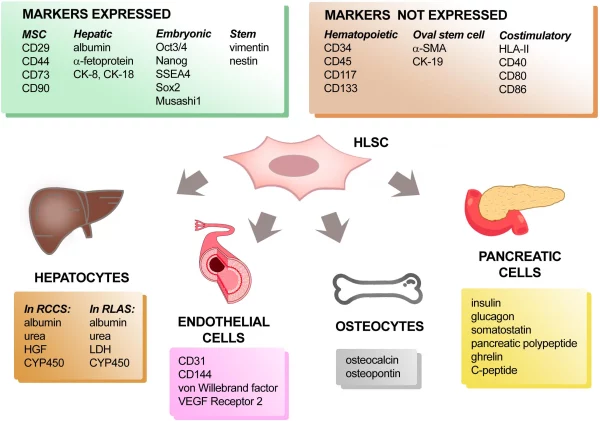Stem cells have the potential to revolutionize the treatment of severe liver diseases. The liver is a highly regenerative organ, but when it sustains excessive damage, its ability to repair itself diminishes. This is especially true in cases of advanced liver failure caused by cirrhosis or other chronic conditions. Liver transplantation is often the only option for patients in such scenarios. However, a recent study at the University of Edinburgh has introduced a promising alternative: using stem cells to regenerate the liver, even in cases of severe damage.
In this study, scientists successfully utilized bile duct-derived stem cells to repair severely damaged livers in mice, restoring not just liver structure but also function. This was achieved by injecting stem cells into the livers of the mice, triggering a robust regeneration process that led to near-complete recovery within a few months. Notably, this approach enables the liver to heal itself when its natural regenerative capacity has been compromised.

“While liver transplantation remains the primary treatment for patients with liver failure, our goal is to develop a cell therapy that can be clinically applied to patients who are not candidates for transplantation,” shared Professor Stuart Forbes, lead researcher at the University of Edinburgh, in his report published in Nature in 2023. This groundbreaking research not only offers hope to liver failure patients but could also open doors to treating other conditions linked to cellular dysfunction, such as blindness, Parkinson’s disease, and arthritis.
A key aspect of this research is the ability of stem cells to differentiate into various liver cell types while regenerating critical areas of the liver. This recovery not only restores liver function but also rejuvenates essential processes such as detoxification and bile production. Bile duct-derived stem cells, when cultured in the lab, can transform into the specific liver cells needed to repair damaged areas—something ordinary liver cells cannot achieve.
“The combination of stem cells and the liver’s regenerative capability could provide a novel treatment for patients with severe liver failure, offering them a chance to survive without requiring a transplant. This could revolutionize liver disease treatment,” noted Professor Forbes.
Although further clinical trials on human tissues are necessary, the findings of this study provide significant hope for the future. Scientists continue to refine this approach with the aim of using stem cells to treat severe liver diseases and potentially extend its application to other conditions. This marks a crucial advancement in biomedical research, promising to transform how chronic liver diseases and other organ-related conditions are treated.


HPX24h > Science > Stem Cell Liver Regeneration: A New Solution for Patients with Severe Liver Failure
Tagged Articles
Stem Cell Therapy for Lung Cancer: A New Hope Entering Human Trials
Discovery of a New Stem Cell: A Major Advancement in Creating Human Organs
Top Reads from This Category
Science
AI Can Make Life Easier, But Is It Harming Your Ability to Think Critically?
Science
New Artificial Kidney via Nanotechnology: A Revolutionary Alternative to Dialysis
Science
Nanotech Technology to Destroy Blood Clots: A New Breakthrough in Stroke and Heart Attack Treatment
Science
NSF Workforce Cuts – Which Path Will the U.S. Take to Stay Competitive in the Global Tech Race?
Science
Laser Therapy Could Help Regrow Your Teeth – Did You Know?
Science
Direct Brain-to-Brain Communication via the Internet
Science
Innate Intelligence: What Role Do Genetics Play in Developing High IQ
Discover New Topics
Healthy Eating
Why Do We Need Fiber in Our Diet?
Health
What Is Epigastric Pain and What Causes It
Science
The Secret of the Bee Brain: New Technology Enables Drones to Fly Independently
Health
Fruits That Can Spike Blood Sugar Levels: Be Cautious
Space
3D Lunar Map: A New Gateway to Understanding the Universe
Space
Tidal Heating: A New Challenge for Extraterrestrial Life
Fitness
Safe Exercises for Early Pregnancy: Tips to Keep Moms Healthy and Strong
Space
Scientists Discover Dark Galaxy Located 10 Billion Light-Years from Earth
Fitness
More Flexible – The Secret to Longevity?
Animals
Unexpected Science: When Seismologists Listen to Underwater Earthquakes and Discover Whale Songs
Parenting Tips
How to Talk to Your Child About Drugs Effectively
Health
How Losing Just 5% of Your Weight Can Reduce the Risk of Diabetes
Parenting Tips
Discover How Japan’s Education System Creates Self-Disciplined, Responsible Students Without the Need for Pressure